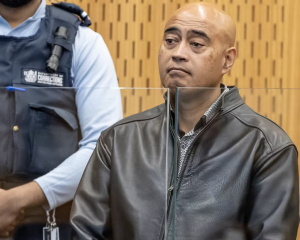
The cost averages just under $4932 per day - compared with the average cost of $302 per day for incarcerating a standard prisoner.
In September 2019, Cabinet agreed funding of $1.9m for the fiscal year 2019/20, and $1.66m for the current fiscal year, for "increased security measures responding to the different needs and risks posed by the individual", newly released Cabinet documents show.
Australian national Brenton Tarrant is New Zealand's most notorious criminal. In March, he pleaded guilty to 51 charges of murder, 40 of attempted murder and one charge under the Terrorism Suppression Act, over attacks that took place in 2019 at the Al Noor and Linwood mosques in Christchurch. The case has garnered world attention.
Special security funding is likely to continue through Tarrant's years of incarceration. His sentencing is scheduled to begin later this month. Tarrant, 29, is expected to spend the rest of his life in prison.
The documents, dated September 2019, suggest the Minister of Corrections should report back to Cabinet on the "operating model used for the individual [Brenton Tarrant] ... and ongoing level of funding required" before the end of this fiscal year.
Kris Gledhill, law professor at Auckland University of Technology, said Tarrant was "marked forever".
There would be "serious consideration of a whole life sentence, the first in New Zealand," and the special costs of both securing Tarrant in prison and keeping him safe from other inmates and sane could easily endure for more than half a century, he said.
Tarrant is an Australian citizen, but New Zealand currently has no established process for returning foreign convicts to serve their sentences at home.
Gledhill said that while the ongoing costs were high, they were not surprising.
"He's going to have a dedicated team of officers who are responsible for him and possibly a couple of other high-risk prisoners, so the staffing costs just [increase], when you've got somebody [who's] maximum security and then add in his particular special circumstances."
It's understood that Tarrant is segregated from other prisoners and held at Auckland Prison (also known as Paremoremo), the country's only specialist maximum security facility.
Carrie Leonetti, associate professor of law at the University of Auckland, said other special costs could include CCTV cameras, X-ray machines, alarm systems, search policies (for both guards and visitors and to search cells for contraband) and additional contact hours with staff trained to detect threats.
Tarrant's infamy and profile as a white supremacist made him at high risk of abuse by other inmates, and a desirable contact for people on the outside, including white supremacists, anti-white supremacists and media.
Leonetti said there could be devastating repercussions for Tarrant's surviving victims and victims' families if he received contraband such as a cellphone and was in contact with the outside world.
Muslim Association of Canterbury and mosque attack victim Feroze Ditta did not believe Tarrant should be afforded the rights to segregation for his own safety.
"Who are we protecting here? It's somebody who slaughtered 51 people. He came to do much more damage and 41 - the rest - were lucky to survive. It's talking about his rights to segregation and as a result it's a cost to the Government."
Ditta supported measures being put in place to ensure Tarrant could not continue to taunt the Muslim community.
"He's done enough damage. We are not interested in what he has to say. He hasn't expressed any remorse so far. He's still going on his rants and his twisted ideology of racism.
"As far as I'm concerned, he's sick, sick, sick. No amount of help would help him."
Special "high-risk" screening
In addition to the extra security measures, Cabinet also approved $800,000 for Corrections to establish a special process for screening "high risk" prisoners' mail.
Cabinet papers said the outgoing mail of such prisoners would be handled under a new, centralised plan. The mail would be couriered from prisons to Wellington and logged, reviewed and assessed there by staff specially trained and approved on the requirements of the Corrections Act 2004, and on "codes and techniques used by inmates in sending messages out."
Assessed mail would then be couriered back to prison directors. The electronic copying of prisoner mail is limited by provisions in both the Corrections Act and the Privacy Act.
Previously, prisoners' mail screening was not centralised. The new initiative was hastily formulated, the documents show, after an incident last year, whereby a prison letter from Tarrant was posted on the internet message board 4chan, and appeared to rally the support of white supremacists.
Corrections subsequently confirmed that Tarrant had sent seven letters during his imprisonment. Five were responses to fan letters.
A Corrections spokeswoman said the department was unable to provide further detail quickly about the cost of Tarrant's security.
She said no information would be provided about the prisoner's management or location.
"To provide any information would pose serious and significant risk to the secure management of this person, which would compromise the safety of our staff and the public."












